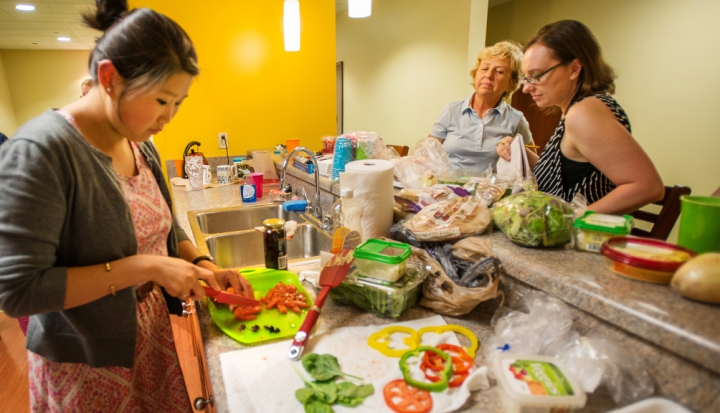This famous food author insists there’s much to be gained from sitting around the table and sharing a home-cooked meal.
For award-winning author Michael Pollan, food rules. And in today’s culture, it seems as though we are always being bombarded by the latest recommendation for the best way to consume food. One study will show that fatty foods are doing us in; the next week, we are implored to reduce our sodium intake, only to hear from a new expert that it’s really sugar we should be avoiding. But according to Pollan, there’s really one primary rule that we should follow: “Eat food, not too much, mostly plants.”
When he scans our current food culture, Pollan sees how we’re being encouraged by food marketers to snack on individually packaged, processed foods as opposed to real, natural food. “The food manufacturers love us to snack because those are the most profitable products,” Pollan explains. “They want us to buy this up because they’ll sell more food that way.
“We’ve gotten away from the real meaning of food, and the power of food, too,” Pollan says. “It’s an enormous loss because there’s such pleasure. Food can offer so much that we’re not getting.”
One of those losses is what can be gained from cooking a meal at home and sharing it with others around you. “We’re consuming food carelessly with no sense of ceremony, no sense of community,” he says. “We’re eating alone. Twenty percent of food in America is eaten in the car. That’s not really eating. That’s mindlessly fueling yourself.”
What do our choices about food and the way we eat say about us as individuals and as a culture?
Our food choices are very consequential. They have an enormous effect, not just on our health, which seems pretty obvious but is often forgotten, but on our world—on the other species that we share this planet with, on agriculture, on the economy. It’s one of the most important votes we cast.
In America in the last 40 to 50 years, really post-World War II, we’ve had a large forgetting of what food really is and the fact that food is not just a thing. It’s not just some material good. It’s a set
of relationships.
We look at food now and it’s sold to us as just a product, a fuel, a short-term pleasure. In fact, it implicates us in a whole web of relationships with the world.
What’s going on right now, among more and more people, is that we’re being recalled to that reality about food. It’s happening because of great chefs. It’s happening because of writers and journalists. It’s happening because people were missing something in their lives that food has given people historically, which is a sense of community. Social connections are a very important thing that food provides.
What are some examples of these social relationships?
Cooking is very much about sharing and generosity. If you cook, you’re going to sit down and have a meal with other people—your family or your friends or your community. The meal is implied in the process, yet way too often we’re eating alone now.
I talk in my newest book, Cooked, about something called secondary eating, which is a new category measured by the Department of Agriculture. Secondary eating is eating while you’re doing other things: driving, walking down the street, watching television.
Secondary eating is now taking up more of our time than primary eating. Primary eating is a weird term, but it’s the new sociological term for meals, which only take up 67 minutes of our day. We’re moving toward eating alone. That’s a tremendous problem. The sociality of food is the most powerful thing about it.
There’s an experiment I did with my family involving a microwave meal. We all went to the supermarket and picked up whatever we wanted. My son wanted Chinese stir-fry in a bag from P. F. Chang’s and a French onion soup. I got an Amy’s vegetarian curry, and my wife got a Stouffer’s lasagna. We microwaved them all to see what kind of a meal it would be.
The microwave is the ultimate in individualism in appliances, because you can only cook one thing at a time. By the time the third entrée was cooked, the first one was getting cold. That had to be renuked. We never got to sit down at the table together because we were constantly getting up and checking the microwave and taking care of our own little dish and wondering, “Did it taste the way we thought it would?”
It was a very centrifugal meal. It didn’t pull us together—it moved us apart. That’s happening all too much in American society these days.
That’s what we’re rediscovering. People are very interested in the story of their food. The reason they’re interested in the story is because the story always connects. It connects you to other people, and it connects you to other species. It connects you to your world.
What are the connections between nature, culture, and the cook?
Being the cook situates you in an interesting place in the world. You’re halfway between the natural world, which is where our food comes from, and the social world, or the people you feed. You’re looking both ways and you’re translating between those two worlds. You’re taking the things coming off the farm and transforming them in ways to make them healthier, more attractive, more flavorful. Then you’re offering them to people. It’s a very privileged position to be in.
Cooking is about transforming nature into culture. It’s amazing how many different cultures have viewed it that way; they’ve used cooking as the metaphor for that human process of taking nature and turning it into something more exalted or more useful to us.
French anthropologist Claude Lévi-Strauss talked about the raw and the cooked. The raw was natural and it was wild, the animal world. The cooked world was the civilized, the human, the social. Many cultures have thought about it as the thing that separated us from the animals.
There’s a leading theory out there that it was the discovery of cooking, which happened something like 2 million years ago, that really altered our evolutionary history. For the first time our species had more energy from food, and so much more nutrition. When you cook food, it becomes easier to digest and easier to chew, and it is broken down much more easily in your body in general, so you don’t have to use energy to digest it.
How much else are you going to get done if you’re chewing food six hours a day? You’re not going to edit magazines. You’re not going to write books. You’re not going to have culture. You’re not going to have opera. You’re not going to have religion.
You’ve said before that what we’re consuming today isn’t food, and how we’re consuming it isn’t really eating. If that’s true, then what should we be doing instead?
We’re eating what I call “edible, food-like substances” far too often. These are very complex creations of food science that simulate real foods but are full of salt, fat, sugar, and lots of food additives. It’s the difference between a loaf of bread you might get from the bakery—a simple thing made of flour, water, salt, and yeast—versus the 30 ingredients in a loaf of Wonder Bread, for example.
I don’t think we should dignify that kind of stuff with the word “food,” that beautiful word. We’re eating a lot of that stuff, not exclusively, but it’s a big part of the diet. If you go into the supermarket now, there’s more and more processed food and less and less whole food.
A lot of my work is trying to lead people back to the table and back into the kitchen. Not by lecturing them and not by giving them a sermon, but by showing them the satisfactions that can be had here that a lot of people have forgotten.
We’re still not so far removed from it that you can’t remind people what it was like to have a really nice family meal, to remind them of the amazing things that can happen at a table.
What practical advice would you give to the busy parent who might want to have that nice family meal, but who walks in the door after a day of work to feed kids who are running off to various activities?
We are under enormous time pressure. We work way too hard in this country. We do—we work more hours than people in any other industrialized country.
There’s a history behind that. We’re hardworking in America, but in our labor movement, we fought for money rather than time. Europeans fought for time. They cook more as a result, and they have long, leisurely meals. They
use their time in ways that are often very attractive.
There are a couple of tips that I offer busy parents. One is that it’s not all on Mom to do the cooking. One of the problems with cooking has been that women were stuck with the work for a very long time, and it became a burden, without question. It’s very important to get everybody, men and women, involved in this process not only as a matter of equity or fairness, but also as a matter of teaching.
Second, I would try to put the kids to work. Kitchen skills are some of the most important things you can teach your kids in terms of their long-term health and happiness. If they’re not old enough to chop an onion, they could gather ingredients from the pantry or they could peel things.
Other things to do are to be strategic in the way you cook. I very often will make a few different dishes on a Sunday. I’ll spend a couple hours in the kitchen, and I’ll make three things for the week, either a large quantity or one thing that I can use in different ways. If I’m roasting a chicken on a Sunday for dinner, I’ll roast two. It’s no more work to roast two chickens, and then you have the basis for tacos on another day or a soup on yet another day.
Plus, there are plenty of wonderful recipes for getting real food on a table in 20 minutes. If your kids can’t wait 20 minutes for dinner, then you have some other things to work on.
It’s been said that eating is a moral act. Do you see any intersection between faith and eating?
It’s a moral act. It’s an ethical act. It’s a political act. It’s all those things. It’s one of those choices we make that ramifies all the way back to the earth, affecting many, many people and many, many animals and plants along the way. It’s incumbent on us, if we are having that effect on the world, to look at it and be conscious. It starts with becoming conscious about what’s at stake. Then you make the choices.
There’s not one correct way to eat. People are always asking me, “What’s the best choice for this?” I always say, “What matters to you? Are you primarily concerned about the environment? Are you primarily concerned about your health? Are you primarily concerned about animal welfare?” It really depends. All those issues are at stake.
The spiritual side of it is something that I talk about a lot in Cooked. I really do think there’s something sacred about food. It connects us to the larger world around us. There’s communion at stake, in the social sense anyway.
I spent some time learning how to make cheese from Sister Noella Marcellino, who is a nun at a Benedictine abbey in Connecticut. She’s very spiritual about her work. In fact she believes—and maybe to some people this sounds a little bit heretical—that cheese should be in the Eucharist along with bread and wine. Two other fermented foods, by the way. The Eucharist is all about fermentation.
Anyway, the reason Sister Noella believes this is because she thinks cheese is a very good symbol for human flesh and its corruptibility, and the fact that it doesn’t last. Cheese is a lot like flesh in many ways. It gets old and gets weird and wrinkly and ugly. She’s got a wonderful take on it.
She just feels that it’s a reminder of our mortality. One of the things the Eucharist does, one of the things religion does, is to help us confront our mortality. She’s doing it by making cheese.
What other symbolism can we find in food and through cooking?
There’s a homily by the priest at the same abbey, where he talks all about fermentation. He makes this wonderful parallel that what Christ was doing to the teachings of the Old Testament was essentially fermenting them: acting on them and transforming them.
There’s a lot of symbolism, a lot of meaning in food, and we’re barely aware of it. I became more aware of it by doing this kind of work. As soon as you start fermenting food, you’re very taken with transformation.
The fact that you can transcend something very basic, and turn it into something very special and much more meaningful than it was—there’s a spirituality in that too. It’s a great gift that we have, that we know how to do that. Cooked is definitely the most spiritual book I’ve written. It’s less political and more spiritual than some of the others.
What was your favorite new thing that you learned from working on Cooked?
I got really excited about fermentation. I learned how to make sauerkraut and kimchi and cheese and beer. How to make alcohol from grain and water. Baking bread was, for me, the most satisfying. I didn’t know how to bake bread. I had made a little bit of bread, kind of easy recipes. I’d never made a real fermented sourdough bread. I got in the habit, and I got comfortable doing it. That is still magic to me.
I know why it was a good miracle for Christ. You take something very small and muddy and just kind of sitting there, and it multiplies. It really does multiply, or seems to. It’s mostly air of course, but it’s more than what was there when you started.
That magic still impresses me every time I take bread out of the oven. The symbolism of bread I totally understand. If you work with bread, you get it. You get why it has this resonance for all these different religions.
When you set out to write this book, were you hoping to discover anything specific?
I wanted to ask, “What are the basic principles behind cooking?” It’s the way I like to come at any subject. It’s like asking, “Let’s go back to the very beginning. How did it start? What’s the science? How does it work?” And just kind of peel away the crust of what we think we know about something.
As I started looking, I said, “OK, it’s about transformation, clearly, but there’s not just one kind of transformation. It’s not just heat. It’s not just fire.” I looked at it and realized it corresponds to the four elements. There are four really big transformations that are the common denominator under almost all the different dishes you can make.
And they are?
Fire is the oldest transformation. That goes back perhaps 2 million years, and had this effect on our evolution that I was describing.
Water is cooking in pots. That was another big innovation. It didn’t come along until about 10,000 years ago. Once you can cook in pots, you can boil water and put food in it. Food is softened. Flavors are combined. Nothing is wasted.
If you’re grilling meat over a fire, the fat and many nutrients are disappearing, falling into the fire. But when you cook in a pot, everything is preserved. It’s very economical. It allows you to take really gnarly pieces of meat and soften them and make them really delicious. I use that to discuss everyday home cooking, too. It’s the most domestic kind of cooking we do.
Fire is very much male, public, ceremonial cooking tied to ritual sacrifice, actually. That’s how it started. That’s why men were involved in it, because priests and butchers and cooks were the same person when it came to a feast back in both the Old Testament and in ancient Greece. Whereas cooking in pots has been historically a female realm—it’s indoors, domestic, not for the public, but for the family.
Air is baking. How do we put air into food? How do we transform it using both fermentation and heat? Bread is 80 percent air. We like other aerated foods, such as soufflés and carbonated drinks. For some reason, we like air in our food. It elevates our food.
The last is earth, which is fermentation. This is cooking without the use of any heat whatsoever, strictly by the action of microbes, bacteria, and fungi.
I go through the four transformations. In each case, I found a teacher, someone who’s really a master of that particular kind of transformation, whether they’re a baker or a barbecue pit master. An Iranian American chef taught me about pot cooking, and I learned from the picklers and brewers.
I apprenticed myself to them, and I learned at their feet, basically. They opened up their bakery or their butcher shop or whatever it was to show me how to do these things. The reader follows me in my education as I get better and better at doing these things. Some of them I got good at. Some of them, not so much.
Do you think there’s a danger in the westernization of our way of processing food?
America has gone farther down this path than other countries, which is to say industrializing our agriculture and our way of eating. Other countries have had richer, stronger food traditions.
Our country, since we consist of immigrants, doesn’t have that one central, dominant food tradition. We have a lot of different ethnic food traditions. The biggest influence is the English tradition, which is very much about meat and a few vegetables, and is not the most distinguished cooking tradition. If we had to pick one, we didn’t pick very well.
Because we’re a younger nation and we’re composed of all these different peoples, it was harder for us to resist when fast food and other industrial products came along. We were more vulnerable to the marketing telling us that this is what food is. This is what you should be eating. This is good for you.
Whereas these countries with really well-developed food cultures—like China and Italy and France—these were precious traditions enforced by the grandmothers, in a way, and the mothers, and they resisted for a lot longer the blandishments of processed food. It’s now happening all over the world, but we’re farther along than they are. That’s been my experience doing reporting in other countries.
Do you think that other cultures can look at the modern Western diet and steer away from the path of destruction?
I’m hoping some of these other cultures—China’s a very good example—look at what’s happening here and the fact that we’re struggling with these very high rates of chronic disease and obesity, and see that our food system is making us sick. I hope they preserve what they have before they dismantle it and go down this road.
China is eating more and more Western. They’re starting to get heart disease, which they essentially didn’t have, and obesity and type 2 diabetes. It’s important to understand that these were not common diseases before the industrialization of food, which I date to the late 1800s and the advent of white flour. That was a really key turning point. It led to lots of chronic diseases.
The miracle is that any traditional diet has kept people healthy. There’s no one traditional diet. They all work, but the modern Western diet is the one that doesn’t work. It’s quite an amazing thing for a civilization to have all these ways of eating to choose from and have come up with one that reliably makes the population sick.
What tips do you have for your average person facing this Western way of eating?
The meta rule, the rule above them all, is, “Eat food, not too much, mostly plants,” which sounds a little simpler than it is. Isn’t it all food? No, as I said earlier, there’s food and there’s edible, food-like substances.
I had to come up with rules to help people distinguish between the two. One of them is, don’t eat anything your great-grandmother wouldn’t recognize as food. Just imagine her when you’re in the supermarket. I’m not saying she was a good cook or that she always ate well, but she wouldn’t recognize certain products that are now in the supermarket.
Don’t buy any foods that are more than five ingredients. The more complicated a food is, the less healthy it’s going to be. Don’t buy any food that has ingredients your third grader can’t pronounce. That’s a really good rule of thumb. These additives are not in ordinary people’s pantries. There’s a reason for that. You don’t need them if you’re cooking.
One of my big food rules is simply to cook. It really is the best thing you can do for your health, for the health of American agriculture, and for the well-being of your family. If you cook, you’re going to have family dinner.
Why is that family dinner so important?
Family dinner is one of the most important institutions of democracy. Think of all the teaching that happens at the table. It’s where kids learn to share. It’s where they learn to take turns. It’s where they learn to argue without screaming. It’s where they learn the news of the day and the art of adult conversation. Where else are you going to get that stuff? They learn manners.
Cooking has the potential to give us a lot. These satisfactions and these values are available to everybody. Everyone can cook, even if you’re going to cook really simply because you don’t have a lot of time. It’s economical, too. It doesn’t take money to cook. It saves you money.
Time is the challenge. Time is really the challenge, but I’m convinced that we make time for the things we value and have decided are important.
This article appeared in the December 2013 issue of U.S. Catholic (Vol. 78, No. 12, pages 28-32).
Want to read more? Here’s a web-only sidebar that looks at how our food system affects what we eat.
Image: Flickr photo cc by roanokecollege













Add comment